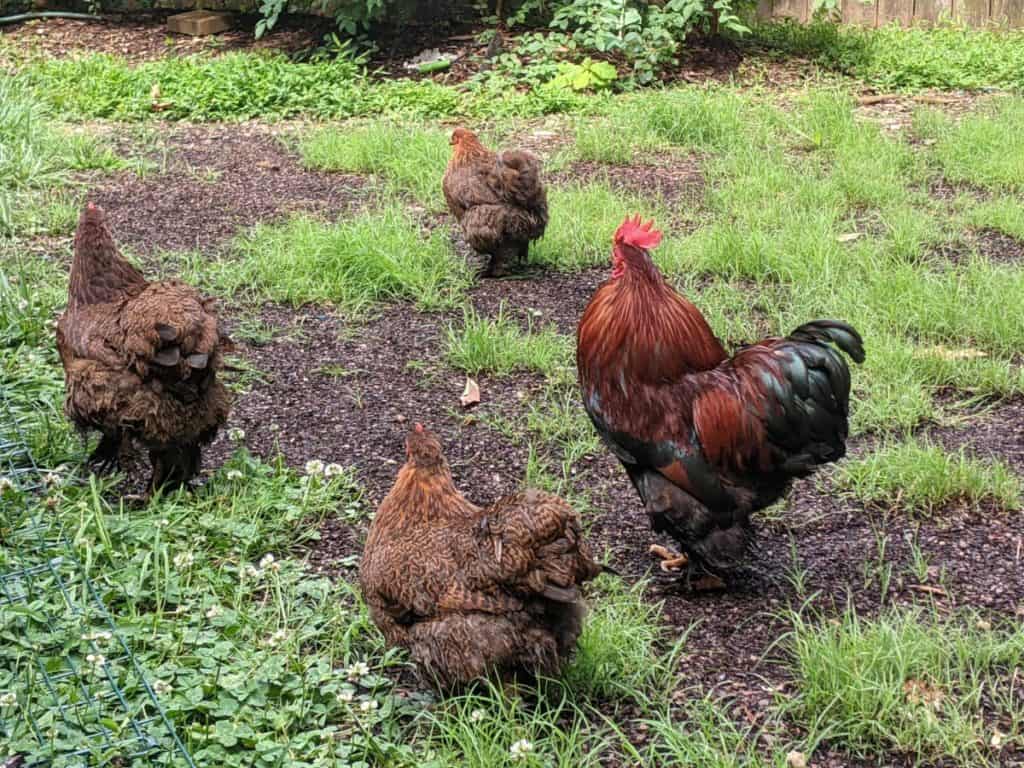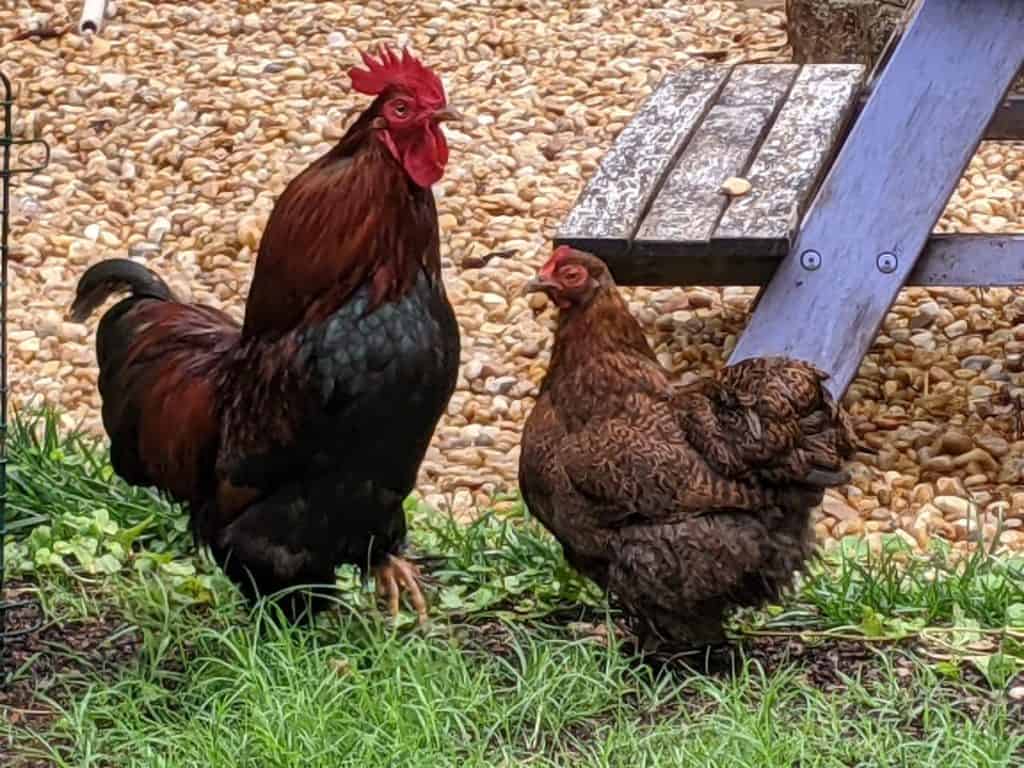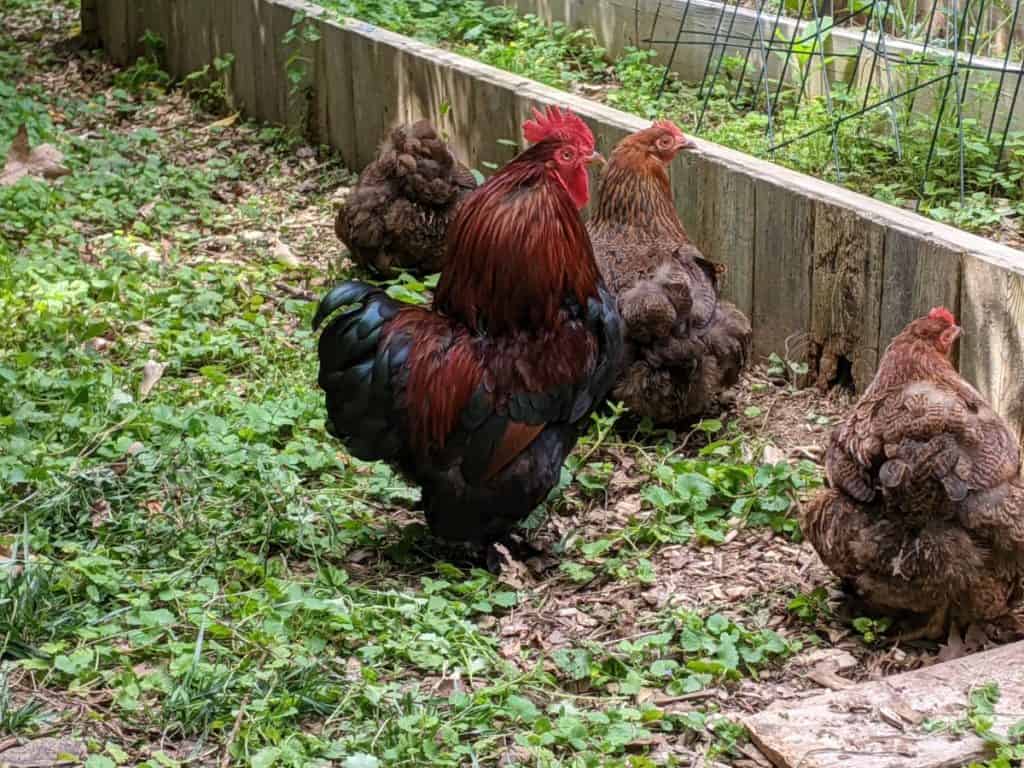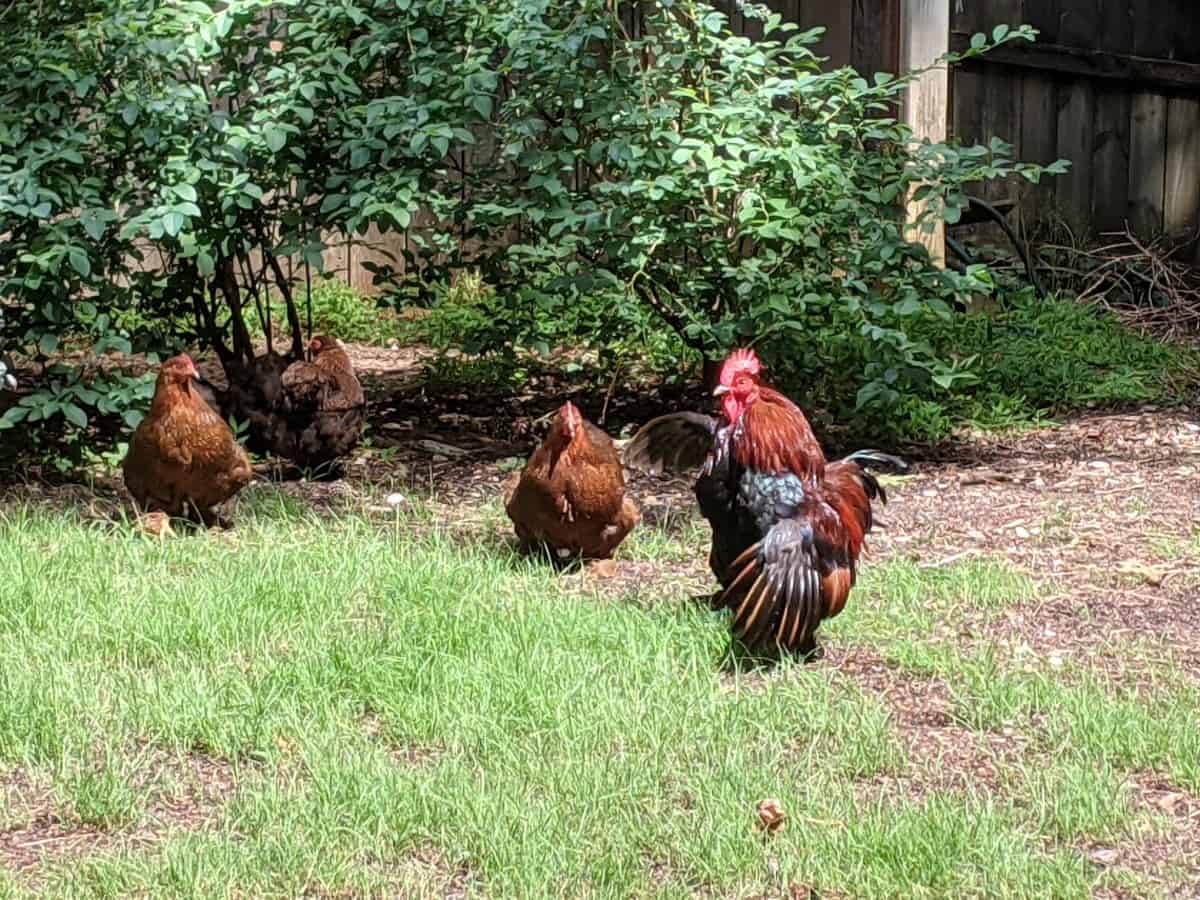Are you thinking of letting your chickens roam free? Before you decide to free-range your chickens, you should study the benefits and dangers and decide if it will work for your flock.
Teach your chickens how to free-range in a securely fenced area at first before you let them out during the day. At night time, call them back to the coop with feed to safely lock them up for the night. Even though your chickens are free-range, they are still going to need supplemental feed.
Here is everything you need to know on how to free-range healthy, productive, thriving chickens.
- What do you need to free-range your chickens?
- Supervised free-range within a fenced area.
- How to teach your chickens the coop is home.
- Should you lock your chickens up at night?
- Where do free-range chickens lay their eggs?
- Do I need a rooster with my backyard flock?
- What are the benefits of free-ranging chickens?
- Conclusion
What do you need to free-range your chickens?
Free-ranging provides your chickens a larger and more natural environment. However, just leaving your chickens out on their own to fend for themselves is not advised.
All chicken owners know that free-range chickens still require some care, protection, and supervision. Free-ranging can also be defined as allowing your chickens to be outside an enclosed pen for all or part of the day.
That doesn’t mean there can’t be fences. Chickens can free-range within a larger fenced-in area such as a backyard, a field, or a pasture. Just take note that while fences will help contain your flock, chickens can and do fly out sometimes.
When you need to lure the chickens back into the coop at night, some type of veggie or some bread works well for me when I need to draw the flock back to the coop for roosting.
To start to free-range your chicken yard, you will need to prepare a few things before you can just let them out into the yard.

Supervised free-range within a fenced area.
- Prepare your fenced area. Fence off the area you want your chickens to free-range in the yard. Strong, safe, high fences will keep out predators. Chickens don’t like to be crowded, so give them enough space. Plan out the size of your area. Six chickens will need a coop with at least 18 feet and the free-range outside area to be at least 110 square feet.
- Provide a coop. Provide a coop for your chickens inside the fenced-off area where they can safely shelter from the rain, hide from predators and roost in at night.
- Nesting boxes. Place some besting boxes inside the coop to give your chickens a place to lay their eggs.
- Provide cover. Providing cover for your free-range chickens is essential to keep them safe from aerial predators. Shrubs, bushes, or trees inside the chicken yard will provide shade, shelter, and a place to hide from aerial predators. My chickens love to forage and relax under our eight blueberry bushes.
- Provide drinking water. Chickens need access to fresh drinking water throughout the day. There should be multiple watering stations set up around the areas where the chickens will be free-ranging and in their coop.
- Keep the fences clear. Keep the grass around the fences short of removing any areas predators can hide.
- Teach your chickens to come in at night. By feeding your chickens in the coop at night, you teach them to follow you and come in at night for their safety and protection from predators and against the elements.
How to teach your chickens the coop is home.
You should keep your chickens inside their coop for at least one week before you let them out. This teaches the chickens that the coop is “home,” and they will instinctively come back home to roost at night.
Should you lock your chickens up at night?
Your chickens should have a safe, warm place to roost in at night. It is recommended to lock up your chickens at night to protect them from predators. Your chickens will naturally gravitate back to the coop at dusk once you teach them it is home.
Depending on where you live if you don’t lock them up you may wake up to your flock being decimated. I have had trouble with possums, raccoons, and other predators at night.
If they don’t come back on their own, you can encourage them back into the coop with a little bit of chicken feed.
Shake the bucket with the feed every night while calling them when it is time to get back into the coop. Your chickens will soon learn this is feeding time and follow you back into the coop where you can safely close them in for the night.
Where do free-range chickens lay their eggs?
Even though your free-range chickens are giving you more tasty and nutritious eggs, they make it hard to collect these precious commodities at times.
This is because some free-range chickens choose to lay eggs in hidden places around the yard. Looking for eggs in your yard can be frustrating. To help solve this problem, you can keep a few nesting boxes around the yard to encourage the chickens to use them.
This will help save you time because your hens will lay their eggs in those nesting boxes so you can find their eggs easily.

Do I need a rooster with my backyard flock?
Keeping a rooster with your free-ranging hens can be good idea if your neighbors don’t live too close by. Roosters will often warn of impending danger by sounding the alarm giving the chickens time to run to shelter.
All chickens keepers know that most roosters can be aggressive and will try to protect the hens.
The hens usually stay near the rooster while free-ranging while he keeps a lookout for predators. The rooster will peck, watch, peck, and watch some more while he circles the flock, always on alert. Roosters are however very loud. There are both pros and cons to having a rooster with your flock.
What are the benefits of free-ranging chickens?
- Free-range chickens eat a lot less commercial feed. When your chickens are free-ranging, they get the opportunity to eat insects, bugs, and other critters. They are not entirely dependent on commercial feed. Thus, saving you money in the long run-on commercial chicken feed.
- Free-range chickens control insects in your yard. Your free-ranging chickens will eat and reduce the number of ticks, bugs, and insects found in your yard. They will almost eat any insect that they can find.
- Your chickens will keep some pests at bay. Chickens will gladly eat small snakes or chase rats away from the yard.
- Free-range chicken eggs are more nutritious. Since your chicken’s diet in the yard consists of naturally foraged foodstuff, their eggs are more likely to be healthier. The eggs of free-range chickens are tastier and more nutritious.
- Free-range chickens are happier, healthier chickens. Free-range chickens are less likely to become overweight. Free-range chickens get enough time to stretch their wings and fly short distances while running around after insects. The chickens get to scratch in the dirt, take dust baths and get more exercise than a chicken that lives inside a cage all day. Free-range chickens live happier lives when they are allowed to live as nature intended them to live.
- Fertilizing and aerating the soil. Chickens are constantly scratching, pooping, and pecking at the dirt, which keeps the ground in your yard fertilized and aerated.
What are the dangers of free-ranging your chickens?
The biggest threat to your free-range chickens is predators. When you let your chickens free-range and roam freely, you expose them to all kinds of predators. Free-range chickens can become an easy meal for hawks, raccoons, possums, foxes, and weasels.
Your fences might keep out dogs and coyotes, and other predators. However, many predators can and will dig or climb over fences. Make sure your fences are well built and that they are high enough to deter any predators trying to get in.
Providing cover to your free-range chickens will protect them from eagles, owls, and hawks.
It is difficult to protect your free-range chickens completely; no matter what you do to protect your flock, you will inevitably lose one or two chickens to a predator at some point. I know have lost hens to hawks, raccoons, and possums.
Always lock your chickens up at night because predators like raccoons are notorious for attacking chickens at night.
Always be aware, listen to your flock; they will sound the alarm when a predator is near and alert you. When you hear unusual sounds coming from the chickens, investigate immediately.

Conclusion
All chicken owners want to keep their flock safe while providing them with the most natural free-ranging lifestyle. Letting your chickens have free range on your farm or backyard is lovely, but you still have a responsibility to provide your chickens with care and protection.
Most people think free-ranging means chickens happily roam around as they please, weeding your garden, eating bugs, and leaving you a few eggs here and there. In reality, free-range chickens need some management.
Make sure to give your chickens a safe area to live with enough shade and cover and a warm coop to roost in at night tucked safely away from predators.
Free-range chickens, when managed correctly, can provide you with entertainment, eggs in abundance, and a very satisfying addition to your family for a long time to come.

